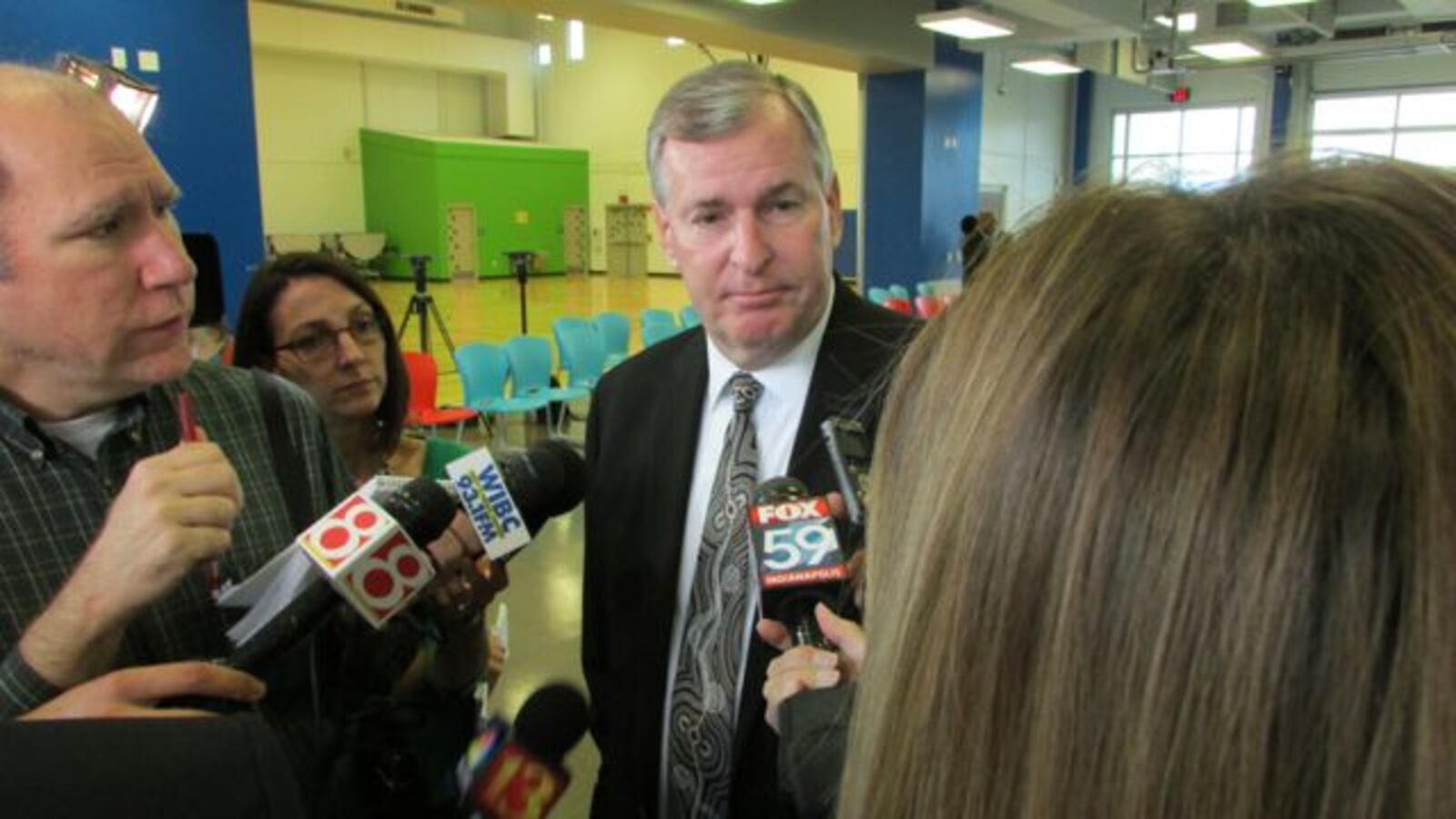Mayor Greg Ballard’s plan to enroll hundreds of poor children in a city preschool program next year took a big step forward Tuesday thanks to a compromise with the City-County Council’s Democratic leadership.
Ballard today praised the scaled-down deal for a $40 million, five-year plan funded by city funds and philanthropic aid brokered by Council Vice President John Barth. The plan is similar to the one Ballard first proposed over the summer as part of a wider effort to address the city’s growing crime rate.
“Today marks a great day for the future of our city and its children,” Ballard said in a statement. “Four months ago, I proposed a holistic approach to make our city safer by addressing the root causes of crime and poverty, including a plan to make preschool affordable to families in need. Indy is now positioning itself as a leader in local support for preschool.”
Ballard said there was no doubt more students in preschool would benefit the city.
“The research is clear – children from low-income families who attend high-quality preschool do better in school later in life and are less likely to get in trouble with the law as juveniles and as adults,” he said in the statement. “I encourage the council to get this agreement on my desk so I can sign it and we can start enrolling children in preschool next year.”
Ballard’s plan derailed because it didn’t have the support of top Democrats on the council, who didn’t like his preferred approach to pay for the preschool through the repeal of a local homestead tax credit. But talks have continued. What came out of the talks was a compromise: a slightly smaller, $40 million plan aimed at poor three- and four-year-olds, according to Barth.
The new plan will prioritize the poorest children first starting with families of four earning up to $30,290. City dollars used to support the new plan include $1.7 million that was saved through a change to the homestead tax credit program, higher interest expected from city investments, and money saved from the mayor’s education office budget if it decides separately to assess 1 percent fee to charter schools.
“My belief going in was we wanted to take a deep, rather than wide approach,” Barth said. “This is exactly how government should work. That people are willing to continue to come to the table and come to some consensus (is good for) the longterm health of the city.”
Deputy Mayor for Education Jason Kloth said the Office of Education Innovation, which is funded by an approximately $600,000 appropriation, has been thinking for some time of assessing a 1 percent fee to the charter schools it authorizes and that it is in the process of talking to its 39 schools about the fee. He said if that happens, the mayor’s education innovation office would no longer need a separate appropriation, so that money could be used to pay for the preschool plan.
“Our hope would be the council would consider reallocating those funds for an educational purpose, potentially preschool,” Kloth said.
Eli Lilly and Company and other corporate groups, which plan to give $10 million to make the plan work, were a key group in making progress on the compromise. Eli Lilly executives said the philanthropic support was contingent on city leaders coming together to find a workable solution this year.
“Both sides really stuck through this, through some difficult times,” said Michael O’Connor, the company’s director of state government affairs. “We’re pleased that this represents a true compromise. We are comfortable that a $40 million plan is substantial and impactful and will really be catalytic in getting this moving in a statewide manner.”
(Read more: Click here to read more of Chalkbeat’s coverage on Ballard’s preschool plan and the ongoing negotiations.)
The revived plan was hailed by preschool advocates in the city, including Early Learning Indiana president Ted Maple.
“I’m excited about our leaders coming together to create what appears to be a good solution,” Maple said. “Obviously, if a disadvantaged child has two years of high-quality preschool, I believe the impact will be greater. It’s still a very significant plan and I think it will help a lot of young children and families. It would really put Indianapolis on the map nationally with regard to the city taking on a leadership role in early childhood education.”
Stand for Children director Justin Ohlemiller, whose organization advocates for change in Indianapolis Public Schools and at the state level, said the compromise was a good sign for continued momentum to expand access to preschool.
“We have to look at the entire continuum of education for our children,” Ohlemiller said. “Anytime you have funding that will increase capacity for early childhood education, those institutions including IPS that see preschool as a key to the future of our children will jump in and try to expand their offerings. It’s absolutely necessary in IPS.”
The new plan will be formally introduced at Monday’s City Council meeting, where it is expected to have support of as many as nine cosponsors from both parties. Some Democrats, including Councilwoman Angela Mansfield, said in recent weeks the city should pursue other priorities ahead of preschool, like expanding animal control efforts and saving trees that are dying because of the deadly emerald ash borer beetle.
“With any proposal, you start by building a coalition and then you grow it based on the quality of your idea,” Barth said. “There’s no doubt that emerald ash borer is an issue to be dealt with. You weigh this opportunity versus addressing emerald ash borer. The priority’s pretty clear. That’s the debate we’ll be having.”

